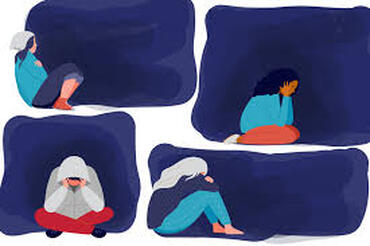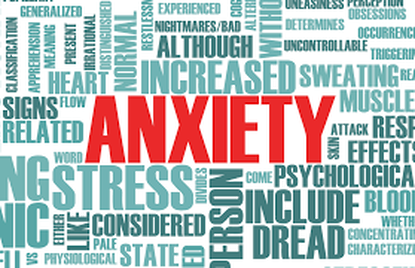Mental Health in Adolescents
|
NEW RESOURCES FOR MENTAL HEALTH
Our sense of mental wellness is just as important as physical health, but according to the latest statistics from Brookline’s Student Health Survey, depression and anxiety among BHS teens have never been higher. We should never be afraid to reach out for help. This page contains resources for helping your child cope with anxiety, depression, self-harm, suicide, school-related stress, and other mental health issues. And parents -- Don't forget to practice self-care. A wealth of information and resources can be found in our updated list of Mental Health Resources, including numbers for suicide and crisis lifelines, local and national resources, and places to explore for help finding support and/or a therapist. And a couple of very helpful Tip Sheets on Typical vs. Concerning Behavior and Supporting a Teen in Crisis can be a good way to start. Here are some tips for talking to our adolescents in ways that acknowledge the anxiety while offering perspective, guidance, and reassurance. And Dr. Sue Varma offers "4 M's" of Family Mental Health during trying times. So what is Mental Health?
Anxiety Anxiety can kick in at any age. While anxiety often is a normal response to challenging circumstances, chronic anxiety is a problem, especially among adolescents. Mindfulness can help. But if you think your child is struggling with anxiety, these resources may be helpful (for children of any age): |
Depression
Clinical depression is a persistent feeling of sadness and loss of interest that interferes with daily function.
Self Harm & Suicide In Brookline, guidance counselors are seeing an increase in adolescent self-harm like cutting at younger and younger ages. Though you may not be aware of children who self-harm, odds are good that your kids know peers who are dealing with emotional pain this way. See the resources below for information about self-harm:
|
|
School-Related Stress
Test-Taking Anxiety Any time teens face a big test or series of tests, like midterms or finals, the stress level at home may start to rise dramatically as students start to deal with the pressure and expectations. What can parents do to help? How can we be supportive without inadvertently adding to the pressure and anxiety? Check out this helpful tip sheet. Also, BHS has three excellent tutorials for students: |
Stress of Junior and Senior Year
By junior and senior year of high school, college application stress can start to take a real toll on students, who repeatedly confess they are overwhelmed by all they have to do in addition to the regular academic workload – college essays, visits, test prep, etc. Also, the stress and workload of school can sometimes trigger mental health concerns in young people.
By junior and senior year of high school, college application stress can start to take a real toll on students, who repeatedly confess they are overwhelmed by all they have to do in addition to the regular academic workload – college essays, visits, test prep, etc. Also, the stress and workload of school can sometimes trigger mental health concerns in young people.
- Center for Online Education’s Critical Mental Health Resources for College Students provides an introduction to some of the major common mental health issues students might face as early as middle school along with links to resources in each state
How Substances Can Affect Your Teen’s Mental Health
For some teens, alcohol and marijuana play a big part in the ways they try to cope, and current attitudes and perceptions are contributing to the problem. Brookline’s recent Wellness Summit illuminated some of the survey’s most pertinent statistics, and a speaker from “Minding Your Mind” shared his personal story. Brainstorming sessions with student Peer Leaders, parents, teachers, PSBMA staff, community leaders and youth serving experts strategized what role we as a community can play in shifting the current culture.
See the following resources for more information:
Below are some local resources Brookline parents have found to be helpful:
Local Institutions Addressing Mental Health Issues:
For some teens, alcohol and marijuana play a big part in the ways they try to cope, and current attitudes and perceptions are contributing to the problem. Brookline’s recent Wellness Summit illuminated some of the survey’s most pertinent statistics, and a speaker from “Minding Your Mind” shared his personal story. Brainstorming sessions with student Peer Leaders, parents, teachers, PSBMA staff, community leaders and youth serving experts strategized what role we as a community can play in shifting the current culture.
See the following resources for more information:
- B-PEN’s Parent Update on the January 2018 Wellness Summit on Mental Health: The Impact of Alcohol & Marijuana
- Alcohol.net addresses how alcohol can affect suicidal thoughts
- TeenMentalHealth.org
Below are some local resources Brookline parents have found to be helpful:
- NAMI Mass Compass Navigator
- Massachusetts Health and Human Services (For problems with Mass. Health or Premium Assistance, Jean Batty is the MassHealth Ombudsman and advocates for MassHealth users. The phone # is: 617-847-3468 or TTY: 617-847-3788 [email protected])
- MassHealth Family to Family Health Information
- HelpGuide
Local Institutions Addressing Mental Health Issues:
- Brookline Center for Community Mental Health
- BCCMH List of Community Programs
- BCCMH List of Social Services Agencies
- Belmont Wellness Coalition
- Mass General Resource Center
- Families for Depression Awareness (resources, webinars, & free care consultation for low-income families)
- McLean Hospital
- Psychology Today Therapists List
- National Alliance on Mental Illness (local chapter in Newton)
Getting Help
It can be very challenging to navigate the health care system to get support and treatment for those with mental health needs. The process may vary considerably depending on one's insurance, income, family dynamic, and of course, an adolescent's specific needs. For families seeking help locating appropriate therapists in the area, an up-to-date list in maintained by Brookline High School's Prevention/Intervention Team (BHS Rm. 149, 617-713-5149 -- [email protected]. For additional resources, the best first step is often to contact a child's primary care provider.
It can be very challenging to navigate the health care system to get support and treatment for those with mental health needs. The process may vary considerably depending on one's insurance, income, family dynamic, and of course, an adolescent's specific needs. For families seeking help locating appropriate therapists in the area, an up-to-date list in maintained by Brookline High School's Prevention/Intervention Team (BHS Rm. 149, 617-713-5149 -- [email protected]. For additional resources, the best first step is often to contact a child's primary care provider.



